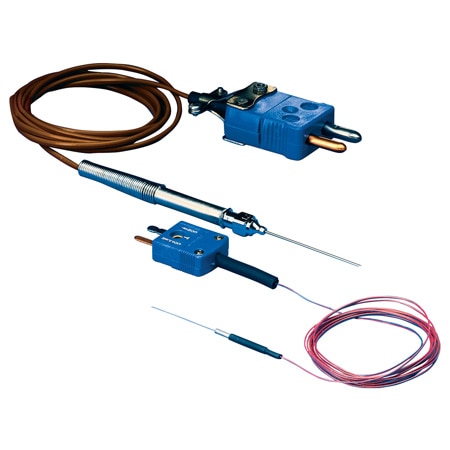Mini-Hypodermic Thermocouple Probe Model HYP-0 The HYP0 Mini-Hypodermic probe with a needle diameter of only 0.2 mm(0.008") is the least likely to disturb the surrounding insertion area. Binocular microscope micromanufacturing techniques result in an extremely small Type K (Alumel-Chromel) thermocouple being implanted in a 33 gage, diameter, 25 mm long stainless steel hypodermic needle. The HYP0 has the fastest response of the hypodermic probes, and has a continuous temperature rating of 200°C(400°F). It has 1.5 m(5ft) long PFA-coated, 36 AWG leads with an SMP-type miniature con
nector.
Thermocouple Probe Model HYP-1 OMEGA™ Hyp Research, autoclavable probe is designed to give instant readings in plants, other semi-solids and liquids. A 30 gauge x 13mm (0.5") needle provides this very fast response. The measurable temperature range is cryogenic to 200°C (400°F). This is a Type K (Alumel-Chromel) and Type E (Chromel-Constantan) grounded-junction probe with PFA-insulated extension wire and a subminiature male connector termination. The entire assembly is steam autoclavable to a temperature of 160°C (325°F).
Thermocouple Probe Model HYP-2The HYP-2 Probes have Natural Science, Industrial and Food Processing uses. This assembly comes complete with a type . T. (Copper-Constantan) element, 1.2 m (4') PFA-insulated lead wires, and uses a standard (21 gage) hypodermic needle 38 mm (1.5") long. 1.2 m (4') lead wire is standard. Standard size male connector terminates the lead wire.
Thermocouple Probe Model HYP-3 OMEGA™ Industrial Hypodermic Probe uses a sixteen 16 gage x 38 mm (1.5") long needle and may contain J, K, T, E calibrations; they may have a grounded or ungrounded junction, and come with stainless steel overbraided extension wire. The stainless steel overbraiding adds flexibility and extends the probe life. These probes are not autoclavable. They are designed for heavy-duty service. 1.2 m (4') lead wire is standard. Maximum tip temperature is 200°C (400°F).
RTD Probe Model HYP-4 The RTD Hypodermic Probes are offered for Industrial, Natural Sciences and Food Processing use. These probes contain a 100 ohm platinum RTD (alpha= 0.00385) within a sixteen 16 gage x 38 mm (1.5") hypodermic needle, and come with 1.2 m (4') PFA-insulated lead wire.
These probes should not be used for human implantation. View the Thermocouple Accuracy and Color Code charts 




